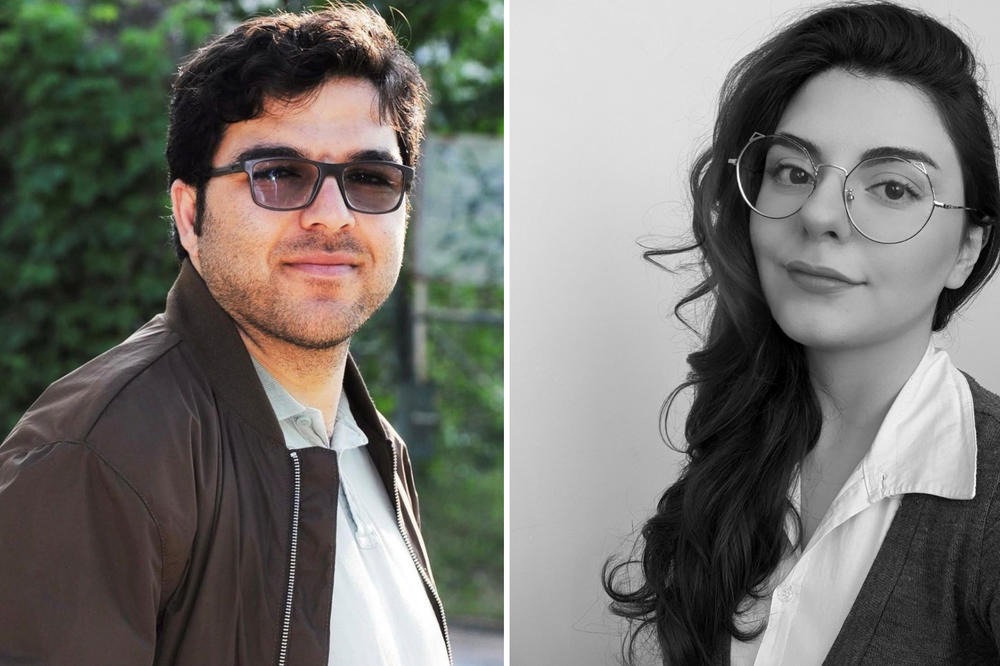Welcome Program German Courses at Freie Universität Berlin Are the Ideal Stepping Stone for Refugees
New German courses for refugees will kick off in August at Freie Universität Berlin. Two participants talk about their experiences in the program.
Mar 20, 2025
Shahhussain Rasuli (left) and Aya Boudaka: Two of the seventy-five participants currently enrolled in the Welcome@FUBerlin program.
Image Credit: Personal collection
For almost ten years prospective students who are refugees have been able to complete an intensive German language program at Freie Universität Berlin. Many of the over 600 participants who have attended these courses have gone on to start a degree program or doctoral studies at Freie Universität Berlin – or even used the program as a stepping stone to a career in Germany.
Aya Boudaka completed almost all of her studies in an active war zone. She enrolled in an English literature degree program at the University of Aleppo in 2011. She managed to complete her degree in 2016 and continued to work as an English teacher, which she had started to do while still a student, while also volunteering for several different organizations. “Aleppo was divided into two sectors during this time,” she says. “One half was controlled by the rebels, the other by the Assad regime – and across the city there were snipers, burned-out cars, and human bodies.”
Her work with an international organization and her participation in conferences in Lebanon put her at an additional risk. One day she received a summons to report to an infamous military base. Around the same time her parents, who had sought refuge in Egypt a few years previously, began to receive strange phone calls. “I stayed in Syria for as long as I could. I wanted to make a difference where I was,” she says. “But then in 2019 I knew that I would have to flee if I didn’t want to fall into the hands of the regime.”
A New Start with the Welcome Program
Boudaka now lives in Berlin. Since August of last year she has been one of seventy-five participants enrolled in the Welcome@FUBerlin program, which has offered German courses to prospective students who are refugees since 2015. “Participants go through an intensive program that brings them to C1 level proficiency in German,” says Juna Kühn, program manager at ERG Universitätsservice GmbH and head of the program. “The goal is for them to take up a degree program at Freie Universität Berlin once they complete their courses.”
Over 600 people have taken part in the program to date. “You can find graduates of this program in every department of the university,” says Kühn. “One former participant went on to become a student ambassador to help his fellow students settle into life on campus.”
The program is financed using part of Freie Universität Berlin’s regular budget and funding from the Senate Department for Higher Education and Research, Health, and Long-Term Care for the State of Berlin. Participants enroll in the university for their German classes, which entitles them to perks such as the semester ticket for public transportation.
Editor-in-Chief in Exile
“Unfortunately it has recently become much more difficult for many refugees to find German classes that go beyond the B1 level,” says Shahhussain Rasuli. “That’s why the program at Freie Universität is such a great opportunity for a lot of people.”
Prior to his escape from Afghanistan, Rasuli had been the editor-in-chief for Hasht-e-Subh, one of the country’s most important independent and non-profit newspapers. He also worked for the German government. “When the Taliban returned to power in 2021 I had to flee with my family,” he says. “We first went to Pakistan, where we were then evacuated by the German government as former on-site employees.”
Rasuli continued to work for his newspaper in exile for the next few months. “All of my colleagues ended up having to flee too,” he says. “Now we’re all working from locations scattered across the world, like Canada, Australia, France, and Germany.”
Taking the Plunge with a German-Language Job
Rasuli is now learning German at Freie Universität Berlin with the goal of beginning a doctoral program in communication and media studies afterward. He has also continued to work as a journalist for Connection Radio, a multicultural radio station in Berlin. “Even if I have lost my home, I will never lose my voice,” says Rasuli. “Reporting is my way of fighting against injustice and bringing about change.”
His classmate Aya Boudaka from Syria is still thinking about whether she will apply for a degree program at Freie Universität Berlin once she has completed her German courses. “I started working as soon as I arrived in Germany back in 2019,” she says. “I didn’t want to have to rely on benefits as a refugee to this country. I wanted to earn my own money right off the bat.”
She worked as a marketing manager at a company where English was the dominant language for two years. “After my German courses I’d like to take the plunge and apply for a German-language job,” she says. “I think I’ll be ready for it once I’ve finished the program.”
Further Information
You can find information on German courses for refugees (Welcome@FUBerlin) here.

